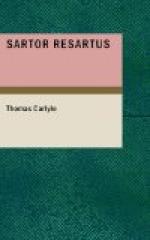“Society,” says he, “is not dead: that Carcass, which you call dead Society, is but her mortal coil which she has shuffled off, to assume a nobler; she herself, through perpetual metamorphoses, in fairer and fairer development, has to live till Time also merge in Eternity. Wheresoever two or three Living Men are gathered together, there is Society; or there it will be, with its cunning mechanisms and stupendous structures, overspreading this little Globe, and reaching upwards to Heaven and downwards to Gehenna: for always, under one or the other figure, it has two authentic Revelations, of a God and of a Devil; the Pulpit, namely, and the Gallows.”
Indeed, we already heard him speak of “Religion, in unnoticed nooks, weaving for herself new Vestures;”—Teufelsdrockh himself being one of the loom-treadles? Elsewhere he quotes without censure that strange aphorism of Saint Simon’s, concerning which and whom so much were to be said: “L’age d’or, qu’une aveugle tradition a place jusqu’ici dans le passe, est devant nous; The golden age, which a blind tradition has hitherto placed in the Past, is Before us.”—But listen again:—
“When the Phoenix is fanning her funeral pyre, will there not be sparks flying! Alas, some millions of men, and among them such as a Napoleon, have already been licked into that high-eddying Flame, and like moths consumed there. Still also have we to fear that incautious beards will get singed.
“For the rest, in what year of grace such Phoenix-cremation will be completed, you need not ask. The law of Perseverance is among the deepest in man: by nature he hates change; seldom will he quit his old house till it has actually fallen about his ears. Thus have I seen Solemnities linger as Ceremonies, sacred Symbols as idle Pageants, to the extent of three hundred years and more after all life and sacredness had evaporated out of them. And then, finally, what time the Phoenix Death-Birth itself will require, depends on unseen contingencies.—Meanwhile, would Destiny offer Mankind, that after, say two centuries of convulsion and conflagration, more or less vivid, the fire-creation should be accomplished, and we to find ourselves again in a Living Society, and no longer fighting but working,—were it not perhaps prudent in Mankind to strike the bargain?”
Thus is Teufelsdrockh, content that old sick Society should be deliberately burnt (alas, with quite other fuel than spice-wood); in the faith that she is a Phoenix; and that a new heaven-born young one will rise out of her ashes! We ourselves, restricted to the duty of Indicator, shall forbear commentary. Meanwhile, will not the judicious reader shake his head, and reproachfully, yet more in sorrow than in anger, say or think: From a Doctor utriusque Juris, titular Professor in a University, and man to whom hitherto, for his services, Society, bad as she is, has given not only food and raiment (of a kind), but books, tobacco and gukguk, we expected more gratitude to his benefactress; and less of a blind trust in the future which resembles that rather of a philosophical Fatalist and Enthusiast, than of a solid householder paying scot-and-lot in a Christian country.




